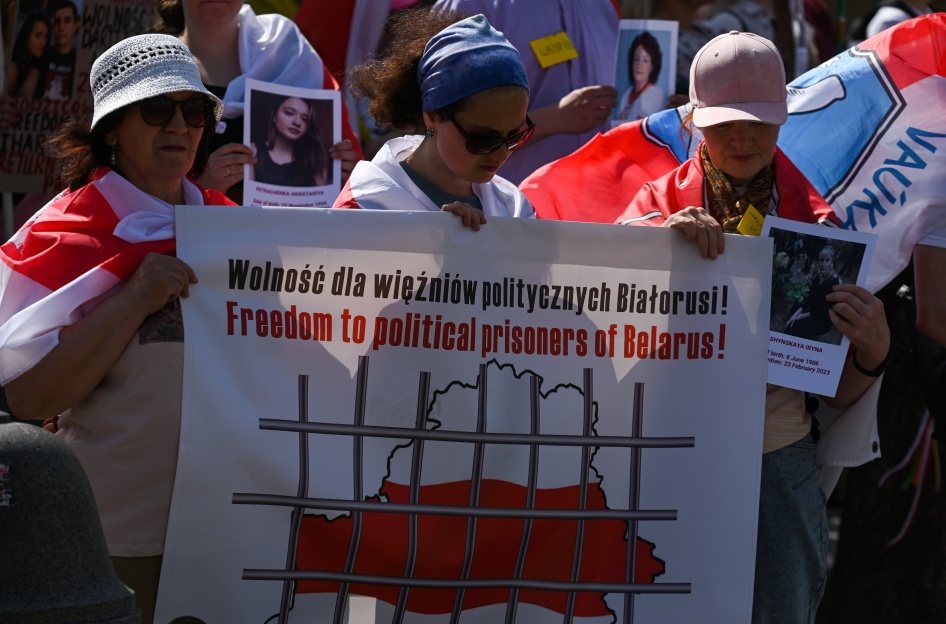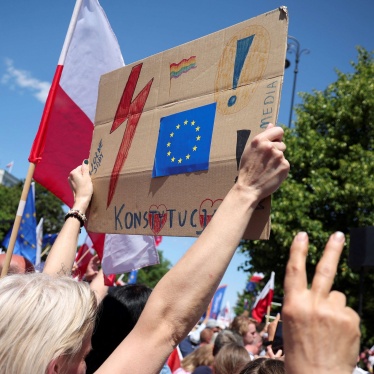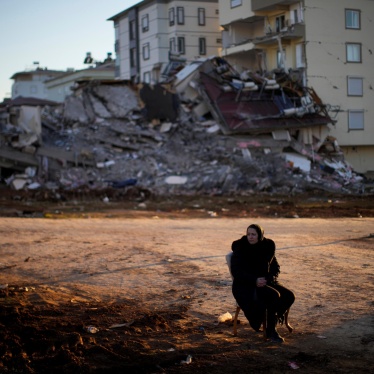(Vilnius, January 11, 2024) – Belarusian authorities carried out a widespread and systematic crackdown on dissent and on the spread of information about rights abuses during 2023, Human Rights Watch said today in its World Report 2024.
The Belarusian government targeted human rights defenders, journalists, lawyers, opposition politicians, culture workers, trade unionists, activists, and other people perceived to disagree with the official agenda. In early November, at least 1,462 people were behind bars on politically motivated charges according to the leading Belarusian rights group Viasna.
“Over the past year, Belarusian authorities doubled down to create an information vacuum around raging repressions by cutting political prisoners off from the outside world and bullying their lawyers and families into silence,” said Anastasiia Kruope, assistant Europe and Central Asia researcher at Human Rights Watch. “Widespread repression continues in an expanding information void.”
In the 740-page World Report 2024, its 34th edition, Human Rights Watch reviews human rights practices in more than 100 countries. In her introductory essay, Executive Director Tirana Hassan says that 2023 was a consequential year not only for human rights suppression and wartime atrocities but also for selective government outrage and transactional diplomacy that carried profound costs for the rights of those not in on the deal. But she says there were also signs of hope, showing the possibility of a different path, and calls on governments to consistently uphold their human rights obligations.
Belarusian authorities increasingly held political prisoners in incommunicado detention and subjected them to torture, isolation in punishment cells, and other forms of ill-treatment. Since February, the authorities have prevented Maria Kalesnikava, Siarhei Tsikhanouski, Viktar Babaryka, Mikola Statkevich, and other prominent political prisoners from communicating with their lawyers and families. Dozens more faced severe restrictions in communicating with the outside world. Over the past year, at least two political prisoners died in penal colonies due to untreated illness.
Human rights work remained de facto illegal in Belarus and not a single human rights group could officially register in the country. In June, the Minsk City Court sentenced a prominent rights defender, Anastaisia Loika, also known as Nasta Lojka, to seven years in prison in reprisal for her human rights work following a closed trial.
Over the past year, Belarusian authorities took several major steps to target Belarusians in exile in retaliation for their activism and to attempt to discredit them. In July, legislative amendments to the citizenship law entered into force, allowing authorities to strip Belarusians abroad of their citizenship, even if they have no other citizenship, if they had been convicted on charges of “participation in an extremist organization” or “grave harm to the interests of Belarus.” Under Belarusian law, exiled Belarusians can be tried in absentia with no fair trial guarantees.
In September, Belarus abolished the authority of consulates and diplomatic missions to issue, replace, or extend passports or identification cards of Belarusians abroad. This exposed exiled Belarusians to risk of statelessness and forced some to return to Belarus, where they faced arbitrary arrest and prosecution on politically motivated grounds.
The authorities used a variety of bogus charges to prosecute alleged critics. Such charges included “defaming” Aliaksander Lukashenka, the head of the country, or the Belarusian government or state symbols, and “extremism” and “terrorism.”
Three years after the August 2020 protests that followed a rigged presidential vote, the authorities have not effectively investigated thousands of individual complaints of mass, arbitrary detention; the use of excessive force; torture; and other ill-treatment of protesters. In February, the Office of the UN High Commissioner for Human Rights reported on systematic, widespread, and gross human rights violations by Belarusian authorities in the aftermath of 2020 elections, concluding that some may amount to crimes against humanity.
The authorities continued prosecutions in relation to 2020 peaceful protests and against those speaking out against Russia’s war on Ukraine and Belarus’s role in the armed conflict.
Belarus remained the last country in Europe and Central Asia to carry out the death penalty. In March, new amendments into the criminal law entered into force, introducing capital punishment for “high treason” by state officials and servicemen. The authorities most recently carried out an execution in July 2022 and last issued a death sentence in October 2023.
The humanitarian crisis at the European Union borders with Belarus continued. Over the past year, many migrants attempting to cross to the EU, including children, were repeatedly pushed back by Polish, Lithuanian and Latvian authorities, and found themselves stuck on the Belarusian side of the border, facing the risk of death and abuse by Belarusian officials, who repeatedly forced them to re-attempt crossing







